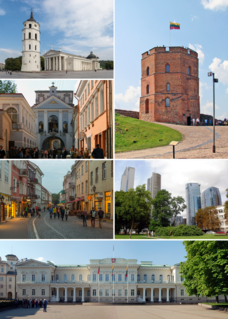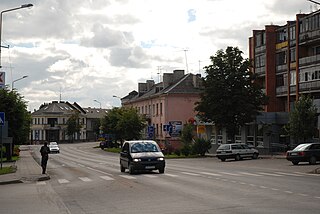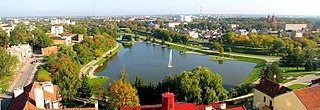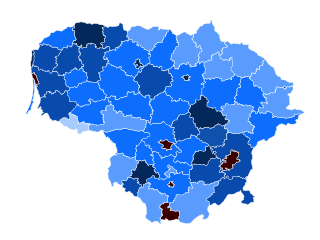
Lithuania, officially the Republic of Lithuania, is a country in the Baltic region of Europe. It is one of three Baltic states and lies on the eastern shore of the Baltic Sea. Lithuania shares land borders with Latvia to the north, Belarus to the east and south, Poland to the south, and Kaliningrad Oblast of Russia to the southwest. Lithuania covers an area of 65,300 km2 (25,200 sq mi), with a population of 2.8 million. Its capital and largest city is Vilnius; other major cities are Kaunas and Klaipėda. Lithuanians belong to the ethno-linguistic group of the Balts and speak Lithuanian, one of only a few living Baltic languages.

Vilnius is the capital and largest city of Lithuania, with a population of 592,389 as of 2022. The population of Vilnius's functional urban area, which stretches beyond the city limits, is estimated at 706,832, while according to the Vilnius territorial health insurance fund, there were 732,421 permanent inhabitants as of October 2020 in Vilnius city and Vilnius district municipalities combined. Vilnius is in southeastern Lithuania and is the second-largest city in the Baltic states. It is the seat of Lithuania's national government and the Vilnius District Municipality.

Vilnius Airport is the international airport of Vilnius, the capital of Lithuania. It is located 5.9 km (3.7 mi) south of the city. It is the largest of the three commercial airports in Lithuania by passenger traffic. With one runway and 5 million passengers a year. Vilnius International Airport serves as a base for airBaltic, Ryanair, and Wizz Air. The airport is managed by state-owned enterprise Lithuanian Airports under the Ministry of Transport and Communications.

Kaunas is the second-largest city in Lithuania after Vilnius and an important centre of Lithuanian economic, academic, and cultural life. Kaunas was the biggest city and the centre of a county in the Duchy of Trakai of the Grand Duchy of Lithuania and Trakai Palatinate since 1413. In the Russian Empire, it was the capital of the Kaunas Governorate from 1843 to 1915.

Vilnius County is the largest of the 10 counties of Lithuania, located in the east of the country around the city Vilnius. On 1 July 2010, the county administration was abolished, and since that date, Vilnius County remains as the territorial and statistical unit.

Joniškis is a town in northern Lithuania with a population of about 9,900. It is located 39 kilometers north of Šiauliai and 14 kilometers south of the Lithuania–Latvia border. Joniškis is the municipal and administrative centre of Joniškis district municipality.

Visaginas is the centre of Lithuania's youngest municipality, located on the north-eastern edge of the country. It was built as a town for workers engaged in the construction of the Ignalina Nuclear Power Plant. Visaginas is the only town in Lithuania where the majority of population speaks Russian as the first language. Originally the aerial view of Visaginas was designed to resemble a butterfly. However, after work on the nuclear power plant was cancelled, so was further construction of the town. Currently Visaginas consists of three residential regions that locals refer to as the 1st, 2nd and 3rd Microdistricts. Visaginas has 14 streets. The city grew up in a pine forest by Lake Visaginas. Tourism is currently an area of great potential, as is the possibility of a new nuclear power plant.

Artūras Zuokas is a Lithuanian politician. He is the Chairman of the political party Lithuanian Freedom Union. He was the Mayor of Vilnius from 2000 to 2007 and again from 2011 to 2015. From 2008 to 2009 he was a member of the Seimas.

Gediminas Avenue is the main street of Vilnius, where most of the governmental institutions of Lithuania are concentrated, including the government, parliament, Constitutional Court and ministries. It is also the location of cultural institutions such as the Lithuanian National Drama Theatre, Bank of Lithuania, Lithuanian Academy of Music and Theatre and Martynas Mažvydas National Library. It is also a popular shopping and dining street. It is partially a pedestrian street in the evenings when traffic is prohibited.

Panevėžys is the fifth largest city in Lithuania. As of 2011, it occupied 52 square kilometres (20 sq mi) with 113,653 inhabitants. As defined by Eurostat, the population of Panevėžys functional urban area, that stretches beyond the city limits, is estimated at 127,471

The January Events, commonly referred to as Bloody Sunday, took place in Lithuania on January 11–13 1991 in the aftermath of the Act of the Re-Establishment of the State of Lithuania. As a result of Soviet military actions, 14 civilians were killed and over 140 were injured. The events were centered in its capital, Vilnius, along with related actions in its suburbs and in the cities of Alytus, Šiauliai, Varėna, and Kaunas.

The Europa Tower is the tallest building in the Baltic states. It is located on Konstitucijos Avenue in Šnipiškės, a district of Lithuania's capital Vilnius. It rises 148 meters above ground level. It was designed by the Vilnius based, Audrius Ambrasas Architects Company. Dominating the skyline of the newly developing New City Center, the building was completed and officially opened on 1 May 2004, as part of Lithuania's celebrations upon entering the European Union. The building caused some controversy among some of the public and some watch-dog groups because of its interference with the historic skyline of the Vilnius' Old Town. Despite varying opinions, the tower is now often regarded as a modern landmark of the Lithuanian capital. There is an observation deck on the open roof terrace at 114 m (374 ft).

Žirmūnai is the most populous administrative division (elderate) in Vilnius. It is also a neighbourhood in the Lithuanian capital city Vilnius, encompassing the city district of the same name, built in the 1960s.

Lithuania attracts many visitors from neighbouring countries and all over the world. In 2018, 1,7 million foreign visitors arrived to Lithuania for business, family and leisure. Historical legacy of the Grand Duchy of Lithuania, rich history, architecture, pristine nature, seaside and SPA resorts are the main attraction points of Lithuania. Domestic tourism is also highly popular - in 2018 it grew by 12% percent. Lithuanians also prefer to spend their vacations in Lithuania - 70 percent.

Lesbian, gay, bisexual and transgender (LGBT) people in Lithuania may face legal and social challenges not experienced by non-LGBT citizens. Both male and female same-sex sexual activity is legal in Lithuania, but neither civil same-sex partnership nor same-sex marriage is available, meaning that there is no legal recognition of same sex couples, so LGBT people do not enjoy all of the rights that non-LGBT people have, and same sex couples in the country do not enjoy the same legal recognition that is given to opposite sex couples. Although homosexuality was decriminalised in 1993, the historic legacy has only resulted in rights for LGBT people that are limited at best. Protection against discrimination was legislated for as part of the criteria for European Union accession and in 2010 the first gay pride parade took place in Vilnius.

Vilnius Metro is a proposed rapid transit system in the Lithuanian capital Vilnius. Three lines are currently proposed to connect the busiest and most populous city districts. Its purpose is the relief of traffic congestion, which increased significantly in the 1990s and 2000s. In 2001 Mayor Artūras Zuokas requested international support for a feasibility study of the proposed system. The proposal was approved as part of the city's master plan by the Vilnius Municipal Council in 2002. Systra was chosen by the city as a study partner; the Scott Wilson Group conducted a public-private financing feasibility study during 2005 and 2006.

A referendum on the presidency was held in Lithuania on 23 May 1992. Voters were asked whether they approved of restoring the institution of the presidency. It was initiated by Sąjūdis.

The Freedom Party is a political party in Lithuania, founded on 1 June 2019 and led by former Liberal Movement member Aušrinė Armonaitė.

Vilnius City Municipality Building is located on Konstitucijos Avenue, Vilnius. The building was completed and opened in 2004. In the past, Municipal Departments and Divisions were scattered throughout the capital. Now they are concentrated in the new center of the Municipality, which has improved the service of the city residents and the working conditions of the municipal employees.

The COVID-19 pandemic in Lithuania is part of the ongoing worldwide pandemic of coronavirus disease 2019 caused by severe acute respiratory syndrome coronavirus 2. The virus was confirmed to have reached Lithuania in February 2020. On 18 March 2020, the first domestic case was confirmed, the first infected being an immediate family member of a known case. The first cases of community spread were found in the country on 19 March and the first related death occurred on 20 March 2020.





















